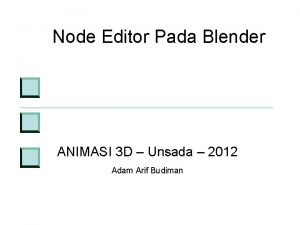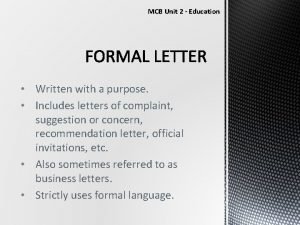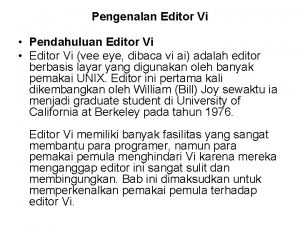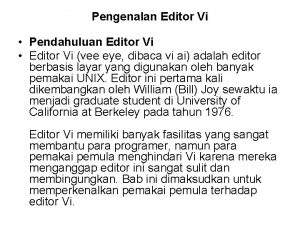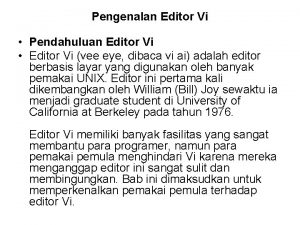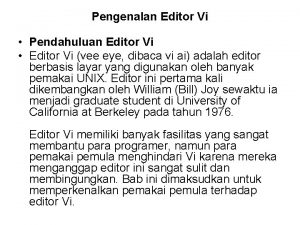Letter to the Editor Use of English Introduction














- Slides: 14

Letter to the Editor Use of English

Introduction n You are going to learn the following things about the letter to the editor… n The purpose n The format n The organization n The language

Why do we write letters to the editors? To comment on news item, articles, other people’s letters n To complain n To express opinions on controversial issues n To praise, thank, suggest, etc. n

Format Date Dear Sir / Madam, (Heading) (Introduction) (Body) (Conlcusion) Yours faithfully, (Your Signature)

Format n Heading : – State briefly the topic you want to talk about in the letter – Example: Hazard to the Public n Introduction: – Identify the topic of the letter in your first paragraphs – Example: I have read something about the use of mobile phones and I would like to write a few words about this.

Format n Body: – Develop your argument in detail in the body of your letter – Example: n As from the articles, I learnt that the use of mobile phones may cause damage to the brain. Certainly their use causes great annoyance to everyone who has to listen to their beeping and ringing, and people shouting into them. What else is a hazard to oneself and to the public? Smoking is one of it and now, smoking is banned or prohibited in many public areas. People are fined for the inconsiderate action they have done to others.

Format n Conclusion: – End with an indication of action you expect to be taken. Or, call for reader’s support to your ideas. – Example: n So, let’s do the same with the use of mobile phones. Yours faithfully, Mr. Nono n Sample: Exercise_Letter to a Parent. doc

Points to note in writing the letter Underline the heading of you letter n A reply letter: underline all the points which you are going to comment on or discuss n Make sure that your facts are correct, with some evidence and reasons for your points n

Points to note in writing the letter One opinion or argument in one paragraph n Be polite and reasonable. n Read the instructions carefully – are you writing comments on a new issue or replying to a given letter? n

Some phrases you can use n 1. Opening (Introduction) – I’m writing to express my views on… / concern about…/ support for… / opposition to… – I would like to draw your (somebody’s) attention to… – I would like to respond to (somebody’s name) ’s letter about… – I want to comment on (somebody’s name) ‘s letter about…

Some phrases you can use n 2. Expressing your opinions – – – – In my opinion, … I think… I feel… To my mind, … In my view, / From my point of view, … As I see it, … To me, … As far as I’m concerned, …

Some phrases you can use n If you support / agree… – – I support… I’m in favour of… I’m all for… I absolutely / totally agree with (other writer) ‘s point about… – (Other writer) is quite right to say that… – I am in total agreement with (Other writer) about…

Some phrases you can use n If you oppose / disagree… – – I’m against… I’m opposed to… I oppose… I completely disagree with (other writer) ‘s point about… – I’m afraid I don’t agree with… (More polite) – I don’t entirely agree with… (More polite)

Some phrases you can use n If you agree partially and disagree with other parts… – While I agree that…, …I can’t support…
 Node editor blender
Node editor blender Letter to the editor introduction
Letter to the editor introduction Grass letter root letter sky letter
Grass letter root letter sky letter Aoifenotes
Aoifenotes How to write a letter to the editor
How to write a letter to the editor Letter to editor
Letter to editor Mcb unit education
Mcb unit education Hát kết hợp bộ gõ cơ thể
Hát kết hợp bộ gõ cơ thể Frameset trong html5
Frameset trong html5 Bổ thể
Bổ thể Tỉ lệ cơ thể trẻ em
Tỉ lệ cơ thể trẻ em Voi kéo gỗ như thế nào
Voi kéo gỗ như thế nào Tư thế worm breton
Tư thế worm breton Hát lên người ơi
Hát lên người ơi Môn thể thao bắt đầu bằng từ đua
Môn thể thao bắt đầu bằng từ đua
